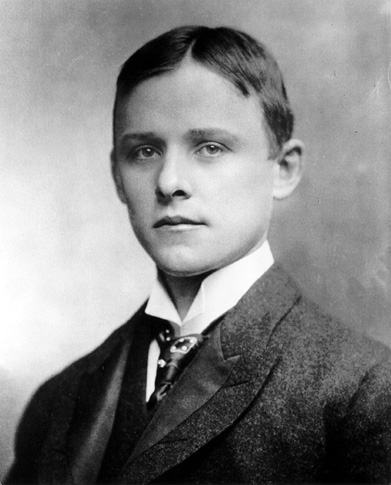
(Oberlin College Archives)
Charles Martin Hall, "American chemist, who discovered an inexpensive method for the isolation of pure aluminum from its compounds. The same elctrolytic process was discovered concurrently by the French chemist Paul L.T. Heroult and is therefore known as the Hall-Heroult process. It became the basis for the aluminum industries both in the United States and in Europe.
Hall was born in Thompson, Ohio, on Dec. 6, 1863. He became interested in chemistry, and more specifically in finding an inexpensive method for producing aluminum, while an undergraduate at Oberlin College. After his graduation in 1885, Hall set up laboratory at home and began work on the purification of aluminum. He had the idea that if he could find a nonaqueous solvent for aluminum oxide, he could produce metallic aluminum by electrolysis, using carbon electrodes. On Feb. 23, 1886, Hall found that molten cryolite, which is the mineral sodium aluminum fluoride, was the solvent he needed for the process; using the cryolite and aluminum oxide and homemade batteries, he produced his first small globules of aluminum.
Hall had trouble finding backers for his process. Eventually he went to Pittsburgh, where a small group formed the Pittsburgh Reduction Company, which grew to be the first largest producer of aluminum in the United States. This company later became the Aluminum Company of America.
Hall spent the rest of his life developing both his process and the aluminum industry. In 1911 he was awarded the Perkin Medal for his work. Hall died in Daytona Beach, Fla., on Dec. 27, 1914."
(The Encyclopedia Americana -- International Edition Vol. 13. Danbury, Connecticut: Grolier Incorporated, 1995. 717)
For more information on the web about Charles Martin Hall and aluminum, please see the following sites:
For resources listed on the web about Charles Martin Hall, please see information regarding "The Charles Martin Hall Collection" at Case Western Reserve University Library, Cleveland, Ohio; as well as the source information provided by Oberlin College Archives, Oberlin, Ohio.
![]() Click
here to return to the historical
preservation page on Hall House.
Click
here to return to the historical
preservation page on Hall House.